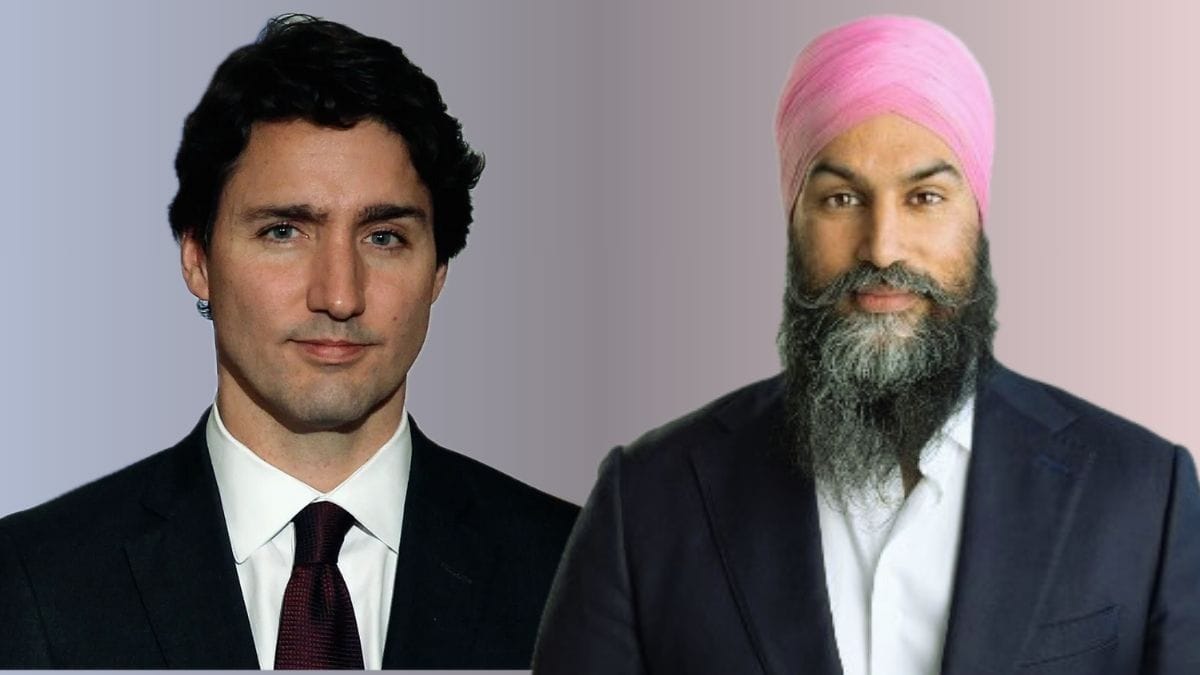Jagmeet Singh No-Confidence Motion NDP Moves to Topple Trudeau Govt
In a significant escalation of Canada’s political landscape, New Democratic Party (NDP) leader Jagmeet Singh has declared his intention to introduce a no-confidence motion against Prime Minister Justin Trudeau’s minority Liberal government.
This announcement, made on December 20, 2024, signals a potential upheaval in Canadian politics, with the possibility of triggering early federal elections ahead of the scheduled date in October 2025.
Since 2022, Trudeau’s Liberal government has operated as a minority administration, relying on a confidence-and-supply agreement with the NDP to pass legislation and maintain parliamentary confidence. This arrangement provided the Liberals with the necessary support to govern without holding a majority of seats in the House of Commons.
However, growing dissatisfaction within the NDP regarding the Liberals’ handling of key issues, including healthcare reforms and economic policies, has strained this alliance.
The No-Confidence Motion
Jagmeet Singh’s decision to proceed with a no-confidence motion stems from a belief that the Trudeau government has failed to address pressing concerns affecting Canadians. In his announcement, Singh stated, “The Liberals have disappointed the public. They are perceived as too weak, too self-serving, and too influenced by corporate interests to advocate effectively for the people.”
The motion is scheduled to be introduced when Parliament reconvenes on January 27, 2025. If passed, it would signify a loss of confidence in the government, compelling its resignation and likely leading to the dissolution of Parliament and the calling of a general election.
Political Implications
The introduction of a no-confidence motion by a former ally places Prime Minister Trudeau in a precarious position. Recent opinion polls indicate a significant decline in public support for the Liberal Party, with the opposition Conservative Party holding a substantial lead. A federal election precipitated by a successful no-confidence vote could result in a substantial defeat for the Liberals.
Conservative leader Pierre Poilievre has been vocal in his criticism of Trudeau’s leadership, calling for immediate elections and asserting that Canada requires a prime minister capable of confronting international challenges from a position of strength.
Options for Prime Minister Trudeau
Facing this political crisis, Prime Minister Trudeau has several potential courses of action:
- Resignation: Trudeau could choose to resign, allowing the Liberal Party to appoint an interim leader who would serve as prime minister until a formal leadership convention elects a new leader. This approach could enable the party to regroup and potentially restore public confidence.
- Proroguing Parliament: By proroguing Parliament, Trudeau could delay the no-confidence vote, buying time to negotiate support or address internal party dissent. However, this tactic may be perceived as undemocratic and could further erode public trust.
- Seeking Support from Other Parties: Trudeau might attempt to secure backing from smaller parties or independent Members of Parliament to survive the no-confidence motion. Given the current political climate, this strategy appears challenging.
- Facing the No-Confidence Vote: Trudeau could confront the motion head-on, allowing the democratic process to unfold. If the motion passes, it would lead to elections, providing an opportunity for the Liberals to campaign on their record and vision for Canada’s future.
Economic Context
This political turmoil coincides with significant economic challenges for Canada. The impending imposition of 25% tariffs on Canadian products by U.S. President-elect Donald Trump poses a substantial threat to the Canadian economy, with potential repercussions including increased unemployment and economic instability.
Additionally, domestic issues such as rising living costs and a housing crisis have contributed to public dissatisfaction with the current government. The resignation of Finance Minister Chrystia Freeland over policy disagreements further exacerbates concerns about the government’s economic strategy.
As Canada approaches the scheduled federal elections in October 2025, the political landscape is becoming increasingly volatile. Jagmeet Singh’s announcement of a no-confidence motion against Prime Minister Trudeau’s government introduces a new level of uncertainty. The coming weeks will be critical in determining the future direction of Canadian politics, with potential implications for governance, economic policy, and international relations.
Canadians and international observers alike will be closely monitoring developments as the situation unfolds, anticipating the potential for significant changes in the nation’s leadership and policy direction.

‘Shadow Presidency’ Elon Musk Influence on U.S. Spending
Elon Musk Influence Political Sparks Spending Bill Chaos Elon Musk, the billionaire entrepreneur and owner of X (formerly Twitter), has once again placed himself at the center of political controversy. This week, Musk’s influence over federal spending negotiations ignited a political firestorm, drawing criticism and sparking debates about the unprecedented role of billionaires in American …
Switzerland ਨੇ ਭਾਰਤ ਤੋਂ Most Favored Nation ਦਾ ਦਰਜਾ ਵਾਪਸ ਲਿਆ

